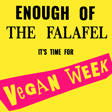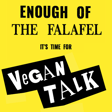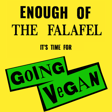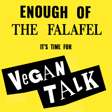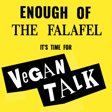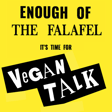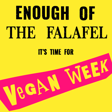
169- Who indoctrinates worse than a vegan? EVERYONE ELSE!!!!!!
See what happens when you let them darn carnists educate about animal agriculture?! This week Julie's pick for the week reports on the odious 'Lend a Lamb' scheme featured on BBC News, where schoolchildren learn about where their food comes from...apart from the quite essential final few steps. Julie & Ant examine this, as well as several more news stories from the last seven days or so- all of which have a vegan or animal rights slant.
****************
Enough of the Falafel is a community of people who love keeping on top of the latest news in the world of veganism & animal rights. With the Vegan Week podcast, we aim to keep listeners (& ourselves) informed & up-to-date with the latest developments that affect vegans & non-human animals; giving insight, whilst staying balanced; remaining true to our vegan ethics, whilst constantly seeking to grow & develop.
Each week we look through news stories from the past 7 days in the world of veganism & animal rights.
If you spot any news stories that might catch our fancy, or have an idea for a discussion topic, get in touch via enoughofthefalafel@gmail.com.
******************
This week's stories:
https://www.theanimalreader.com/2025/04/24/washington-bans-wild-animals-in-circus-joining-global-movement/
https://www.thebureauinvestigates.com/stories/2025-04-29/controversial-chicken-farms-received-millions-in-government-subsidies#:~:text=In%20the%20Wye%20and%20Severn,in%20counties%20near%20the%20Wye.
https://www.lse.ac.uk/News/Latest-news-from-LSE/2025/c-March/LSE-centre-animal-sentience
https://www.greenqueen.com.hk/plant-based-diet-pregnancy-midwives-study/ and https://bmcpregnancychildbirth.biomedcentral.com/articles/10.1186/s12884-025-07549-5
https://feeds.bbci.co.uk/news/articles/cgenv573z04o
https://www.bbc.co.uk/news/articles/cj68glee30eo#:~:text=Plea%20to%20block%20wind%20farm%20over%20thousands%20of%20forecast%20bird%20deaths&text=Conservation%20groups%20are%20urging%20ministers,tens%20of%20thousands%20of%20seabirds.
https://www.bbc.co.uk/news/articles/c4g94k83889o#:~:text=Children%20are%20being%20given%20the,products%20like%20wool%20are%20produced.
https://www.peta.org/media/news-releases/coca-cola-shareholders-demand-bull-zero-sugar-to-stop-cruelty-to-bulls-improve-worker-welfare/
https://www.understandinganimalresearch.org.uk/news/mps-debate-use-of-dogs-in-research-government-maintains-stance
****************
Thanks everyone for listening; give us a rating and drop us a message to say "hi"; it'll make our day!
Julie & Ant
